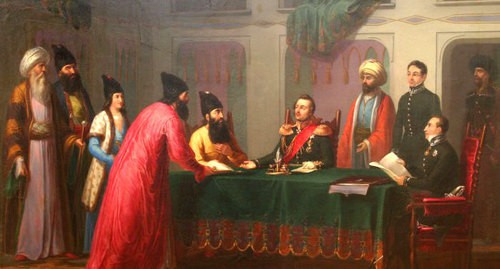
13 February 2019, 13:04
Historians tell about the modern impact of Turkmenchay Treaty
The Turkmenchay Peace Treaty of 1828 divided the territory of historical residence of Azerbaijanis among Russia and Iran; and the subsequent actions of the tsarist regime and the Soviet authorities created the basis for the Karabakh conflict, Azerbaijani historians told the "Caucasian Knot".
At the beginning of the 19th century, the struggle of the Russian Empire with Iran for control over the territories of the historical residence of the Azerbaijani Turks intensified; and during the two Russian-Persian Wars – of 1804-1813 and 1826-1828 – about twenty Azerbaijani khanates were divided among Russia and Iran, Djamil Gasanli, Doctor of Historical Sciences, the Chairman of the National Council of Democratic Forces (NCDF), told the "Caucasian Knot" correspondent.
The historian has added that the Russia's conquest of Northern Azerbaijan led to accelerated changes in the ethnic composition of the region.
"For the first time in the history of Russian Empire, an administrative unit was created under the ethnic principle: thus, immediately after the annexation of the Nakhchyvan and Irevan Khanates, the Armenian region was created. True, it did not last long as an administrative unit, but this name was used to [stimulate] the resettlement of Armenians from Iran and the entire Middle East there. Armenians were also resettled to the territory of the Karabakh Khanate. Thus, the tsarist regime sought to create, in the persons of Armenian Christians, a social support in the conquered region, the bulk of whose population were Muslim Turks," Mr Gasanli has explained.
Firdousiya Akhmedova, the head of the History Division of the Azerbaijan State Management Academy, associates the Karabakh conflict with the aftermath of the Turkmenchay Peace Treaty: changes in the ethnic situation in the region after the Turkmenchay Treaty led to the formation of Armenian autonomy within Azerbaijan during the Soviet era, where separatist sentiments flared up in the end of the 20th century.
This article was originally published on the Russian page of 24/7 Internet agency ‘Caucasian Knot’ on February 13, 2019 at 02:51 am MSK. To access the full text of the article, click here.
Author: Faik Medzhid, Gor Aleksanyan Source: CK correspondents




